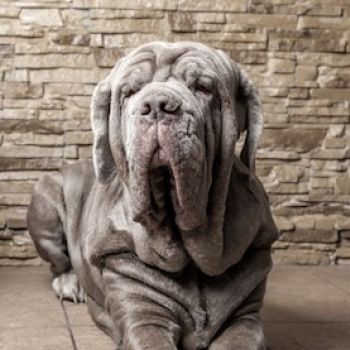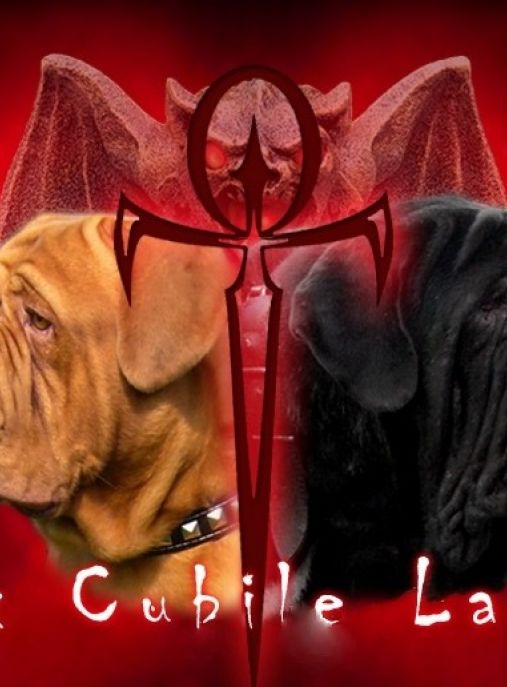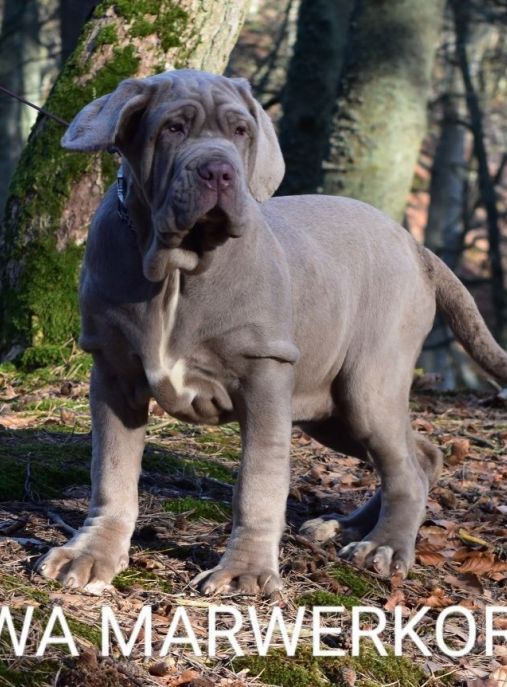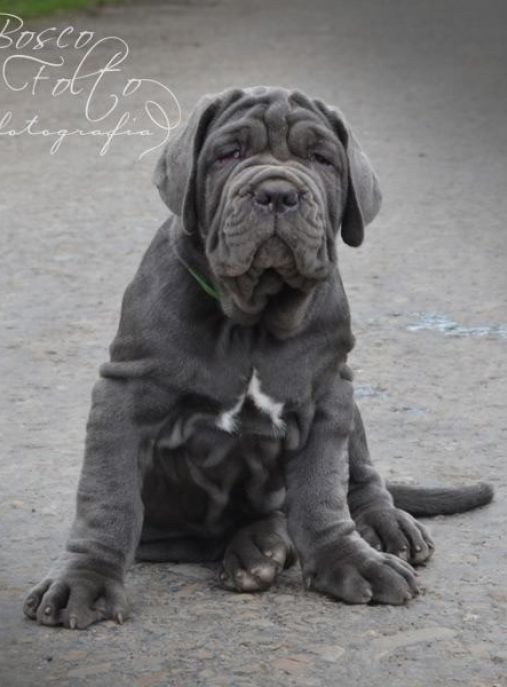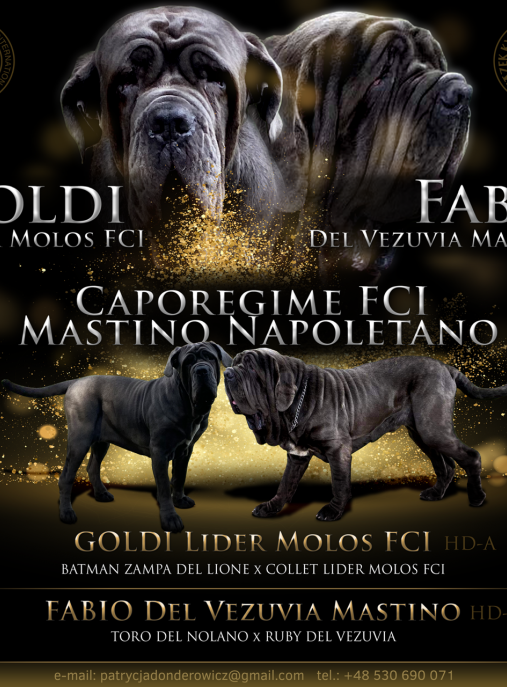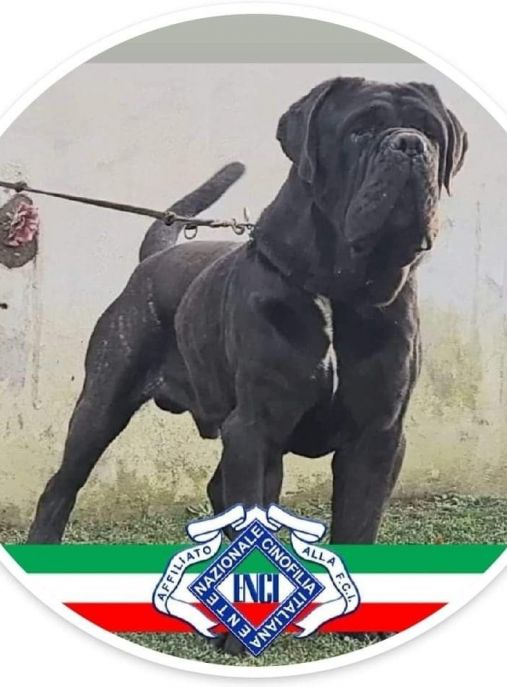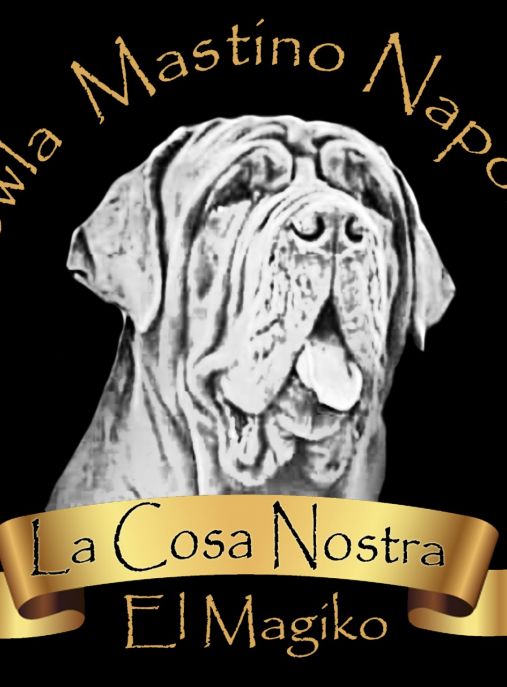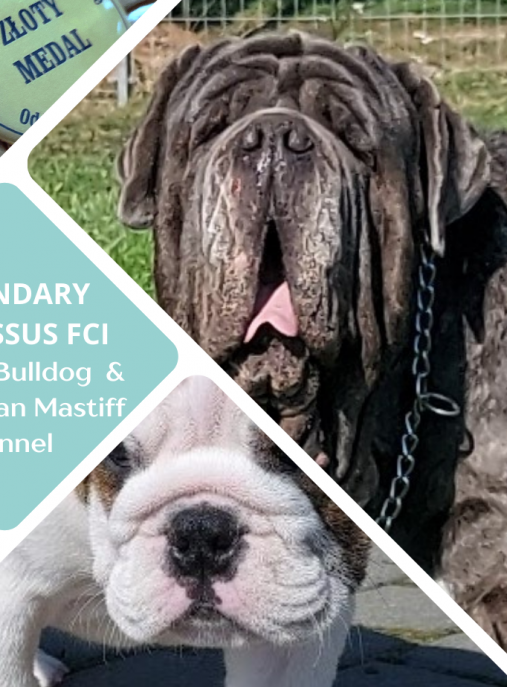The Neapolitan Mastiff, also known as the Mastino Napoletano, is a majestic and powerful dog breed that hails from Italy. With its massive size, imposing appearance, and deeply wrinkled skin, this breed is truly a sight to behold. Neapolitan Mastiffs are known for their loyalty, protective nature, and gentle disposition, making them excellent family companions and guardians.
The history of the Neapolitan Mastiff can be traced back to ancient times, where they were used as war dogs and guardians of estates and properties. It is believed that their ancestors can be found in the ancient Molossus breed, which was used by the Romans in warfare. Over the centuries, the breed evolved and was refined in the region of Naples, Italy, where it gained its distinctive characteristics.
According to the FCI (Fédération Cynologique Internationale) typology, the Neapolitan Mastiff belongs to Group 2: Pinscher and Schnauzer - Molossoid breeds - Swiss Mountain and Cattle Dogs. This group encompasses large and powerful breeds that were historically used for guarding, herding, and protection.
Neapolitan Mastiffs are primarily bred as family companions and guardians. Their protective nature and loyalty make them excellent watchdogs, as they are always alert and ready to defend their loved ones. However, due to their size and strength, they require experienced owners who can provide proper training and socialization to ensure they grow into well-behaved and balanced dogs.
In terms of physical characteristics, the Neapolitan Mastiff is a giant breed. Males typically weigh between 130-155 pounds (60-70 kg), while females weigh slightly less at 110-130 pounds (50-60 kg). Their height ranges from 24-30 inches (61-76 cm) at the shoulder. The breed has a distinctive appearance, with loose and wrinkled skin that forms folds and creases all over their body, especially around the face and neck. Their coat is short and dense, coming in various colors such as black, blue, mahogany, and tawny.
The life expectancy of a Neapolitan Mastiff is around 8-10 years, which is relatively shorter compared to smaller dog breeds. This breed is prone to certain health issues, including hip dysplasia, elbow dysplasia, bloat, and heart problems. Regular veterinary check-ups, a balanced diet, and exercise are crucial to maintaining their overall health and well-being.
Despite their imposing appearance, Neapolitan Mastiffs are known for their gentle and affectionate nature towards their family members. They are incredibly loyal and protective, forming strong bonds with their owners. However, they can be reserved and wary of strangers, which is why early socialization is essential to ensure they are well-adjusted and friendly in different situations.
Neapolitan Mastiffs have a calm and laid-back temperament, often described as "gentle giants." They are generally good with children and can be very patient and tolerant. However, due to their size and strength, supervision is necessary when they are around young children to prevent accidental injuries.
Training a Neapolitan Mastiff requires a firm and consistent approach. They are intelligent dogs but can be stubborn at times. Positive reinforcement techniques, such as rewards-based training and consistency, work best with this breed. Early obedience training and socialization are crucial to ensure they grow into well-mannered and obedient dogs.
In conclusion, the Neapolitan Mastiff is a remarkable breed with a rich history and distinctive appearance. Their loyalty, protective nature, and gentle disposition make them excellent family companions and guardians. However, their size and strength require responsible ownership and proper training. With the right care and guidance, a Neapolitan Mastiff can bring immense joy and love to their owners, making them a cherished member of the family.

The Neapolitan Mastiff, also known as the Mastino Napoletano, is a majestic and powerful breed that possesses a unique character. With their massive size and imposing appearance, these dogs are often misunderstood as aggressive or intimidating. However, beneath their tough exterior lies a gentle and loyal companion.
Neapolitan Mastiffs are known for their calm and steady temperament. They are incredibly devoted to their families and are often referred to as "gentle giants." Despite their imposing size, they are surprisingly gentle and patient, especially with children. They have a natural instinct to protect their loved ones, making them excellent family dogs.
One of the defining characteristics of the Neapolitan Mastiff's character is their unwavering loyalty. They form strong bonds with their owners and will go to great lengths to protect them. This loyalty extends to their territory as well, making them excellent guard dogs. Their deep, booming bark is enough to deter any potential intruders.
While Neapolitan Mastiffs are generally calm and laid-back, they can be reserved and wary of strangers. Early socialization is crucial to ensure they grow up to be well-rounded dogs. Exposing them to various people, animals, and environments from a young age will help them develop confidence and reduce any potential fear or aggression towards unfamiliar situations.
Training a Neapolitan Mastiff requires patience and consistency. These dogs are intelligent but can be stubborn at times. Positive reinforcement techniques, such as treats and praise, work best with this breed. Harsh training methods or physical punishment should be avoided as it can damage the trust and bond between the dog and its owner.
Due to their large size and potential strength, it is essential to establish yourself as the pack leader early on. Neapolitan Mastiffs respond well to firm and consistent leadership. They thrive in an environment where they know their boundaries and have a clear understanding of what is expected of them.
Exercise is crucial for the physical and mental well-being of Neapolitan Mastiffs. Despite their size, they are not overly active dogs and are content with moderate exercise. Daily walks and playtime in a secure area are sufficient to keep them happy and healthy. However, it is important to avoid excessive exercise, especially during their growth stages, as it can put strain on their developing joints.
Grooming a Neapolitan Mastiff is relatively low maintenance. Their short, dense coat requires regular brushing to remove loose hair and prevent matting. Additionally, their facial wrinkles need to be cleaned regularly to avoid any skin infections. Regular nail trims, dental care, and ear cleaning should also be a part of their grooming routine.
In conclusion, Neapolitan Mastiffs are gentle, loyal, and protective dogs. With proper socialization, training, and exercise, they can be excellent family pets. Their calm and steady temperament, combined with their imposing appearance, make them an ideal choice for those seeking a devoted and protective companion.
The Neapolitan Mastiff is a majestic and powerful breed known for its massive size and protective nature. Caring for these gentle giants requires a dedicated and knowledgeable approach. Here are some essential tips on how to care for Neapolitan Mastiffs, including what to do and what not to do.
1. Exercise: Neapolitan Mastiffs are not overly active dogs, but they still require regular exercise to maintain their physical and mental well-being. Daily walks and moderate play sessions are recommended. However, avoid excessive exercise, especially during hot weather, as their short snouts make them prone to overheating.
2. Grooming: Neapolitan Mastiffs have a short, dense coat that requires minimal grooming. Regular brushing with a soft bristle brush will help remove loose hair and keep their coat healthy. Pay special attention to their facial wrinkles, as they can accumulate dirt and moisture, leading to skin infections. Clean the wrinkles gently with a damp cloth and ensure they are thoroughly dried afterward.
3. Feeding: Proper nutrition is crucial for Neapolitan Mastiffs to maintain their overall health. Feed them high-quality dog food formulated for large breeds, ensuring it meets their specific dietary requirements. Avoid overfeeding, as Neapolitan Mastiffs are prone to obesity, which can lead to various health issues. Consult with a veterinarian to determine the appropriate portion sizes and feeding schedule.
4. Socialization: Early and continuous socialization is essential for Neapolitan Mastiffs to develop into well-rounded and confident dogs. Expose them to various people, animals, and environments from a young age. This will help prevent aggression and fearfulness, which can be common in this breed if not properly socialized.
5. Training: Neapolitan Mastiffs are intelligent but can be stubborn at times. Consistent and positive reinforcement training methods work best with this breed. Start training early, focusing on basic commands, leash manners, and proper behavior around people and other animals. Patience, consistency, and rewards-based training techniques will yield the best results.
6. Health care: Regular veterinary check-ups are crucial to ensure the overall health and well-being of Neapolitan Mastiffs. Vaccinations, parasite prevention, and dental care should be a part of their routine healthcare. Neapolitan Mastiffs are prone to certain health issues, including hip dysplasia, bloat, and skin infections. Regular monitoring and early intervention can help manage these conditions effectively.
7. Environment: Neapolitan Mastiffs are not well-suited for apartment living due to their large size. They require a spacious and secure yard to roam and relax. Ensure your yard is securely fenced to prevent them from escaping. Provide them with a comfortable and well-insulated shelter, as they are sensitive to extreme temperatures.
What NOT to do:
1. Do not leave your Neapolitan Mastiff alone for extended periods. They are highly social dogs and thrive on human companionship. Leaving them alone for too long can lead to separation anxiety and destructive behavior.
2. Do not engage in rough play or encourage aggressive behavior. Neapolitan Mastiffs are naturally protective, and improper handling or training methods can exacerbate their guarding instincts, leading to potential aggression issues.
3. Do not neglect their grooming needs, especially their facial wrinkles. Failure to clean and dry their wrinkles properly can result in skin infections and discomfort.
4. Do not over-exercise your Neapolitan Mastiff, especially during hot weather. Their short snouts make them prone to heatstroke, so avoid strenuous activities in high temperatures.
5. Do not ignore their training and socialization needs. Neapolitan Mastiffs require early and continuous training and socialization to become well-behaved and balanced dogs.
By following these tips and providing the recommended care, you can ensure that your Neapolitan Mastiff thrives in a loving and nurturing environment. Remember, they are loyal and gentle companions who deserve the best care possible.
The Neapolitan Mastiff, a majestic and powerful breed, is known for its distinctive coat color. The common color of Neapolitan Mastiff dogs is a range of shades that exude strength and elegance. This breed's coat color is often described as solid and dense, with variations that add depth and character to their appearance.
The most prevalent color seen in Neapolitan Mastiffs is a rich and lustrous shade of gray. This gray color can vary from a light silver-gray to a dark charcoal gray, creating a striking contrast against their muscular physique. The coat is typically uniform in color, with minimal variations or markings.
The gray coat of a Neapolitan Mastiff is often described as having a blue undertone, giving it a unique and captivating hue. This bluish-gray shade adds a touch of sophistication and allure to their overall appearance. It is this distinct color that sets them apart from other breeds and contributes to their regal presence.
Although gray is the most common color, Neapolitan Mastiffs can also be found in other shades. Some individuals may have a lighter coat, resembling a pale gray or even a silver-white color. These lighter shades often have a soft and ethereal quality, enhancing the breed's elegance.
On the other end of the spectrum, some Neapolitan Mastiffs may have a darker coat, leaning towards a deep charcoal or black color. These darker shades create a sense of intensity and power, further emphasizing the breed's imposing stature.
While the primary coat color of Neapolitan Mastiffs is gray, it is not uncommon to find variations or markings on their coat. Some individuals may have small patches of white on their chest or toes, adding a touch of contrast to their overall appearance. These white markings, though minimal, can enhance the breed's visual appeal and give them a unique charm.
In conclusion, the common color of Neapolitan Mastiff dogs is a range of captivating gray shades. From light silver-gray to dark charcoal gray, their coat exudes strength and elegance. The blue undertone adds a touch of sophistication, while variations in lighter or darker shades contribute to their individuality. With their striking appearance, Neapolitan Mastiffs truly embody the essence of a majestic and powerful breed.
The Neapolitan Mastiff, also known as the Mastino Napoletano, is a majestic and powerful breed with a unique appearance and a gentle disposition. While they are generally healthy dogs, like any other breed, they are prone to certain health issues that require careful attention and proactive care. In this text, we will delve into the most common diseases found in Neapolitan Mastiffs and discuss how to ensure their optimal health.
One of the primary health concerns in Neapolitan Mastiffs is hip dysplasia. This condition occurs when the hip joint does not develop properly, leading to pain, lameness, and eventually arthritis. To minimize the risk of hip dysplasia, it is crucial to obtain a puppy from a reputable breeder who conducts health screenings on their breeding dogs. Additionally, maintaining a healthy weight and providing regular exercise can help support strong muscles and joints.
Another prevalent health issue in Neapolitan Mastiffs is cherry eye. This condition involves the prolapse of the gland of the third eyelid, resulting in a red, swollen mass in the corner of the eye. If left untreated, cherry eye can lead to dryness and irritation. Surgical intervention is often necessary to correct this condition, and prompt veterinary attention is crucial to prevent further complications.
Neapolitan Mastiffs are also prone to various skin problems. Due to their excessive skin folds, they are susceptible to dermatitis and infections. Regular cleaning and drying of the skin folds, particularly in hot and humid climates, can help prevent these issues. Additionally, maintaining a healthy diet rich in essential fatty acids can promote healthy skin and a shiny coat.
Gastric dilatation-volvulus (GDV), commonly known as bloat, is a life-threatening condition that can affect Neapolitan Mastiffs. It occurs when the stomach fills with gas and twists upon itself, leading to a blockage of blood flow and potential organ damage. To reduce the risk of bloat, it is recommended to feed multiple small meals throughout the day, avoid vigorous exercise immediately after meals, and use elevated feeding bowls.
Heart disease, particularly dilated cardiomyopathy (DCM), is another concern in this breed. DCM causes the heart muscle to weaken and enlarge, leading to poor pumping efficiency. Regular veterinary check-ups, including cardiac evaluations, can help detect early signs of heart disease. A balanced diet, regular exercise, and appropriate supplementation can also support heart health in Neapolitan Mastiffs.
To ensure the overall well-being of Neapolitan Mastiffs, regular veterinary visits are essential. Routine vaccinations, parasite prevention, and dental care should not be overlooked. Neapolitan Mastiffs are prone to dental issues, so regular teeth brushing and professional cleanings are crucial to maintain oral health.
Exercise is vital for Neapolitan Mastiffs, but it should be moderate and low-impact to protect their joints. Daily walks and mental stimulation activities are recommended to keep them physically and mentally fit. However, it is important to avoid excessive exercise, particularly during hot weather, as Neapolitan Mastiffs are prone to overheating.
In conclusion, while Neapolitan Mastiffs are generally healthy dogs, they are predisposed to certain health conditions that require proactive care. Regular veterinary check-ups, a balanced diet, appropriate exercise, and maintaining a clean and dry environment are essential for their well-being. By being attentive to their specific needs, you can ensure that your Neapolitan Mastiff lives a long, healthy, and happy life.
The Neapolitan Mastiff is a large and powerful breed known for its imposing appearance and gentle nature. To ensure their overall health and well-being, it is crucial to provide them with a balanced and nutritious diet. Proper nutrition plays a vital role in maintaining their muscle mass, promoting healthy growth, and preventing common health issues. Here is an extensive description of the nutrition requirements for Neapolitan Mastiffs, along with advice on feeding and what to avoid.
Protein is an essential component of a Neapolitan Mastiff's diet as it supports muscle development and repair. High-quality animal-based proteins such as chicken, beef, and fish should form the foundation of their meals. These proteins are rich in amino acids, which are the building blocks of muscles. It is recommended to feed them a diet that contains at least 25-30% protein.
Fats are another crucial component of their diet, providing them with a concentrated source of energy. Healthy fats, such as those found in fish oil, flaxseed oil, and chicken fat, are beneficial for their skin and coat health. Including fats in their diet also aids in the absorption of fat-soluble vitamins. However, it is important to monitor their fat intake to prevent obesity, as Neapolitan Mastiffs are prone to weight gain.
Carbohydrates should be included in their diet, but in moderate amounts. Opt for complex carbohydrates like brown rice, sweet potatoes, and whole grains, as they provide a steady release of energy and are rich in fiber. Avoid feeding them diets that are high in simple carbohydrates, such as corn or wheat, as these can lead to digestive issues and allergies.
Neapolitan Mastiffs require a diet rich in vitamins and minerals to support their overall health. Fresh fruits and vegetables are excellent sources of essential nutrients. Incorporate a variety of vegetables like carrots, spinach, and broccoli into their meals. Fruits like apples, blueberries, and bananas can be given as occasional treats, as they provide natural antioxidants and vitamins.
Feeding Neapolitan Mastiffs should be done in controlled portions to prevent overeating and obesity. Due to their large size, it is recommended to divide their daily food intake into two or three meals. Avoid free-feeding, as it can lead to weight gain and other health issues. Consult with a veterinarian to determine the appropriate portion size based on your dog's age, weight, and activity level.
While providing a nutritious diet is essential, there are certain foods that should be avoided for Neapolitan Mastiffs. These include chocolate, caffeine, grapes, raisins, onions, garlic, and foods high in sodium or artificial additives. These can be toxic to dogs and may cause severe health problems.
In addition to a balanced diet, always ensure that your Neapolitan Mastiff has access to fresh and clean water. Hydration is crucial for their overall health and helps regulate body temperature.
Regular exercise is also important for Neapolitan Mastiffs to maintain a healthy weight and prevent muscle atrophy. Engage them in daily walks, play sessions, and other activities suitable for their size and breed.
In conclusion, providing a well-balanced and nutritious diet is vital for the health and well-being of Neapolitan Mastiffs. A diet rich in high-quality proteins, healthy fats, complex carbohydrates, vitamins, and minerals will support their growth, muscle development, and overall health. Remember to feed them in controlled portions, avoid toxic foods, and provide regular exercise to ensure they lead a happy and healthy life.


